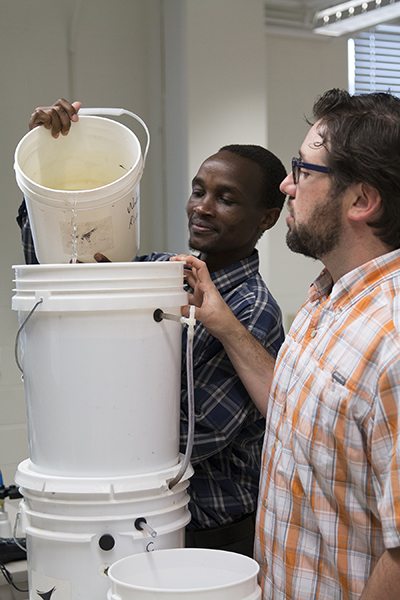Maji Safi has installed 10 large slow sand filters in rural schools in Kenya, and Jafvert and Howarter have installed similar filters in Colombia, Tanzania and China.
The company installs groundwater wells, and provides ceramic filters and slow sand filters, in western Kenya where safe water is not readily accessible.
“Access to clean water is a huge problem that many countries and communities face around the world, especially developing countries,” said John Maiyo, the founder of the company and a doctoral student in Purdue’s College of Engineering.
“Around the globe, twice the population of the US lives without access to safe drinking water, and globally one-third of all schools lack access to safe water and adequate sanitation.”
The Purdue technology used by Maji Safi is a slow sand filter that utilizes containers filled with sand and water.
At the bottom of the container is a water collection plate, designed at Purdue.
The sand provides a large surface area on which microbial growth occurs that metabolizes the dissolved and particulate organic material in the water.
The point-of-use slow sand filters are made from readily available five-gallon plastic pails or 55-gallon drums.
“Typical slow sand filters use gravel layers at the bottom of the filter as the water collection zone, however, our filters do not use gravel,” said company adviser Chad Jafvert.
He is also a professor of civil engineering and environmental and ecological engineering.
“Instead we use a porous plastic plate enclosed within a mesh bag.”
“We’ve found this method to be much simpler to use and maintain.”
“There is only the sand to sieve and rinse, instead of sand and different gravel sizes.”
” It provides easier maintenance and makes for easier filter transportation and final assembly.”
Once water is treated by a filter, a small amount of chlorine is added to the water for final disinfection, producing clear, colorless, drinkable water.
Maiyo said that after 30 minutes of contact with the chlorine, the water is ready to drink.
“People and children in schools come up to the filter systems with a cup to get a drink, and the schools are able to use the water in their kitchens or for cleaning.”
“Because the filters are operated in ‘batch’ mode, water is generally added three times each day, providing for an eight-hour contact time between the water and microorganisms in the filter.”
“Each 55-gallon drum filter can process 200 liters of water each day.”
“With five filters installed at one school, this meets the needs of over 400 children and teachers at the school every day.”
Maji Safi has installed 10 large slow sand filters in rural schools in Kenya, and Jafvert and Howarter have installed similar filters in Colombia, Tanzania and China.










